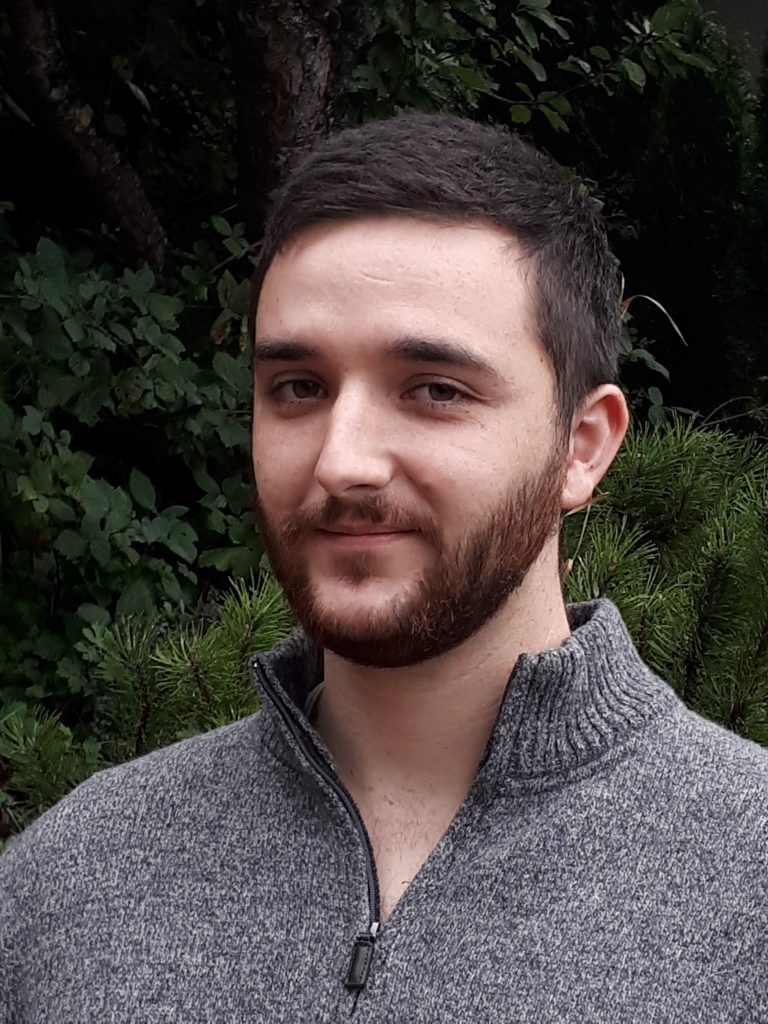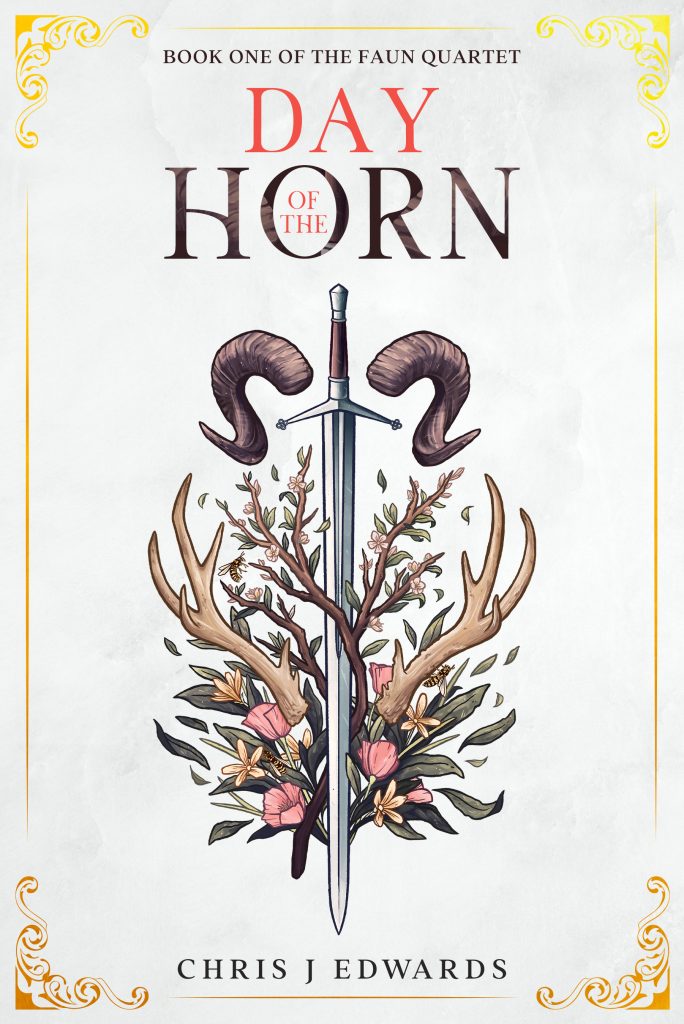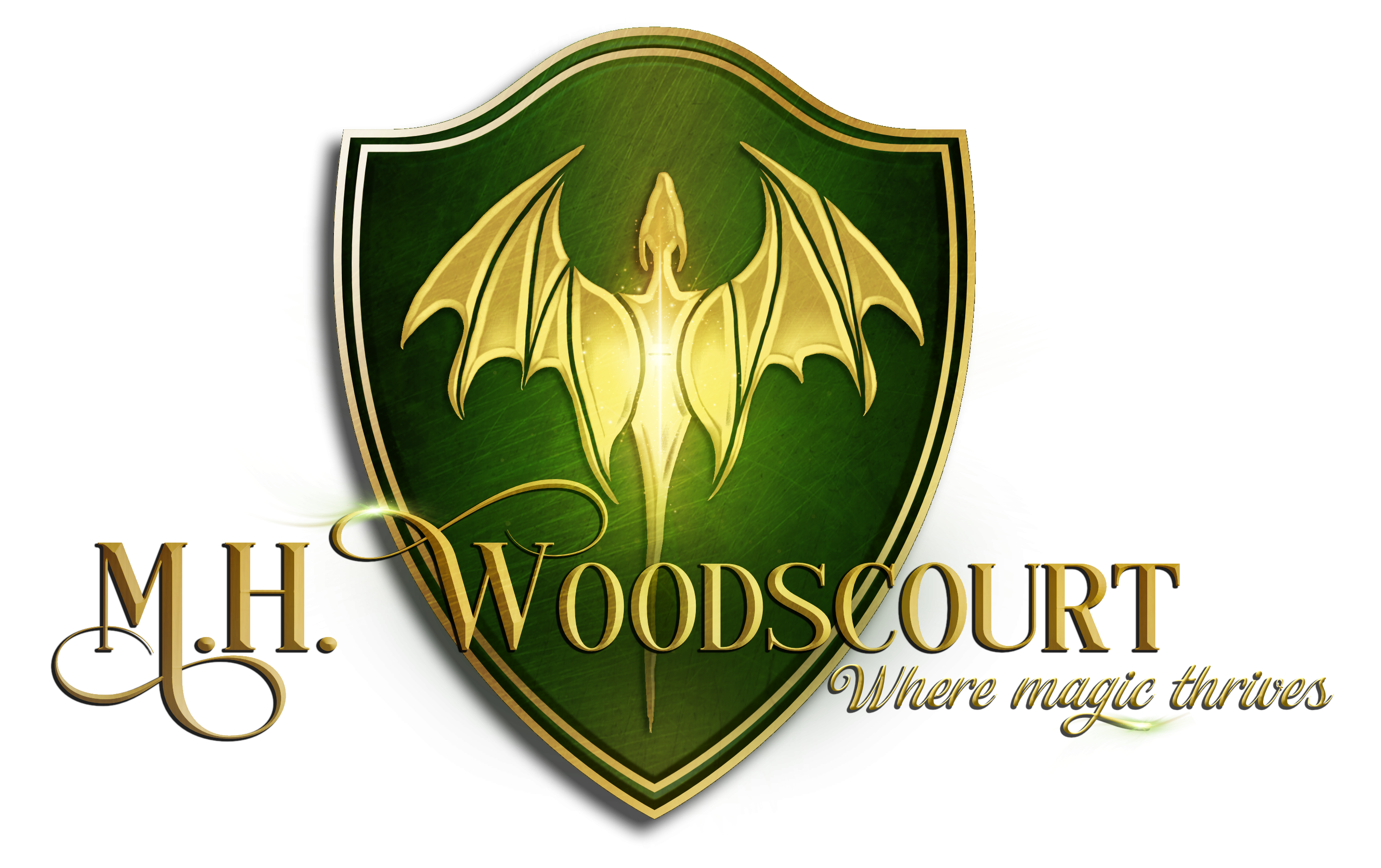
Chris J. Edwards
My featured author this month is the High Fantasy author of the fabulous debut novel Day of the Horn! Learn about his novel, his writing process, latest projects, and more right here.
***
Thank you so much for agreeing to this interview! To kick things off, tell me a little about yourself.
- I was born in British Columbia, Canada – the rainy part, not the snowy part. I have a background in history and French language, both of which I studied as an undergraduate. I am also in the military. I try to be outside as often as I can by running, hiking, and hunting. I also spend a fair bit of time painting, which I am still not very good at. But it’s the thought that counts, or so I’m told.
I’m told the same thing. What led you to write fantasy?
- I started writing fantasy because I wanted the freedom to produce something unique. I wanted people to become totally absorbed in a world that previously had not existed. I haven’t only written fantasy – but fantasy is my favourite playground. I foresee it as the garden in which I will always reside.
Going along with that, what sub-genres of fantasy do you prefer to write?
- High Fantasy is where my true passion lies. That being said, Sword and Sorcery has always had a spot in my heart, and I cannot deny its influence on my own writing!
Do you write with a particular message or worldview in mind?
- I do not write with a particular message in mind. I do, however, actively try to avoid any kind of allegory or reference to current events. For me, fantasy should serve as an escape, not a reminder of the woes of the weary world without.
I definitely relate to that. What is your preferred writing style? Does it coincide with your reading preferences?
- I love writing in first person! Having the opportunity to see through the eyes of an invented character with their own strengths and weaknesses, fears and foibles, memories and opinions – that is the greatest treasure in writing. However, I have certainly written in third person narrative and it has some considerable advantages. But first person will always be my preferred medium!
Do you prefer a sympathetic villain or someone a reader loves to hate? Or is there another kind of villain you prefer to write?
- Villains are the true core of a good fantasy novel. I have heard it said by wiser folk than me that to have a good story, one must start with a good villain. Thankfully, these characters come in all variety; from tragic to irredeemable, understandable to downright dastardly. I, for one, am a fan of villains (in fiction!) and enjoy them in all their wide variety.
I wholeheartedly agree! They’re so dang much fun to write, too.
Tell me more about one of your published works.
- My debut novel, Day of the Horn, is a high fantasy novel and the first instalment in The Faun Quartet. It centres around Princess Dawn, a faun princess who has been kidnapped by a mercenary mage. Luckily for Dawn, her father has sent out every servant at his disposal to rescue her – even a knight who had been imprisoned for killing her cousin in a duel. Meanwhile, plots unfold in the shadows, threatening to drag the whole kingdom into a civil war.The story shifts through multiple points of view, showing each character at their weakest, their most vulnerable, but also at their strongest, their most triumphant. Aside from being an adventurous romp through a fantastical world of magick and myth, Day of the Horn is also an introspective look at self-worth, guilt, forgiveness, and what it really means to be courageous.Also, it has faeries.
It’s on my TBR list right now, and I can’t wait to dive into it very soon!
What are you working on now?
- I am currently working on a fantasy trilogy that takes place in the same world as The Faun Quartet. However, I have chosen to write it in third person narrative, a notable shift from my preferred first person. The setting, too, has changed; the whole story is set in a single city, a vast metropolis filled with deadly intrigue, dangerous plots, and colourful characters.Are you traditionally published or do you publish independently? Why did you choose that path to send your books into the world?
- I chose to publish independently. After doing a lot of research, I realized independent publishing would allow me the most control over my creative work, from the cover design to the time between releases. Because at the end of the day, I write what I want to write – I have stories I want to tell, and I know how I want to tell them!
Who are some of your favorite authors?
- As an amateur historian, I have a handful of non-fiction authors I greatly admire. But for the sake of simplicity and staying on topic, I’ll narrow it down to four fiction authors.
Robert E Howard, HP Lovecraft, Cormac McCarthy, and Joseph Conrad.These choices might seem very strange; you might notice that only one of them is a true fantasy author (Robert E Howard), and he was more a pulpy Sword and Sorcery writer. But I love his storytelling; his bold sense of action and his prose that is so unabashedly purple I can never help but appreciate it.As for HP Lovecraft, I think his impact on fiction, and by extension me, is self-explanatory. His descriptions of beings beyond understanding, sensations beyond sense – I’m not a horror fan, but I make an exception for his unique brand of cosmic horror. Lovecraft’s imagination was as vast as it was confident, something I deeply respect.
Cormac McCarthy wrote Blood Meridian. Once you go read that book, you’ll understand why he’s in my top four.Then, finally, there is Joseph Conrad. In particular, his novella Heart of Darkness. It’s a classic, and the way it is written makes the reader feel lost, confused, and uncomfortable – exactly the way the protagonist feels. It is a masterpiece of experiential prose. Plus, Joseph Conrad wasn’t even a native English speaker, which makes his work that much more impressive!
I remember trying to read Heart of Darkness once yeeaaars ago. Maybe I should give it another go!
What are your writing habits?
- I have worked hard to cultivate good writing habits and a suitably disciplined writing schedule. On a typical writing day, I start shortly after I return from work and don’t stop until I have reached my daily goal. On a day where I don’t have work, I typically spend between 3 and 8 hours writing. But I have also been known to write for up to 14 when I’m trying to stretch. A little music when needed and a few deserved breaks throughout the day go a long way!Do you prefer to plot your books out in advance, or do you dive in and see where the story takes you?
- I like to write a loose (very loose) plot to spiritually guide my writing. I find this helps to keep me from writing myself into a corner, as well as helping to set up scenes that I really want to see come to fruition. Other than that very loose plot, I let the story take its course, making sure to hit those necessary milestones to keep it cohesive.
That rings really familiar to me! Do you enjoy writing plot-driven or character-driven stories more?
- Character-driven.
I find good characters can overcome weak plot, but it is harder for good plot to overcome weak characters. Ideally, however, they will be of equally good quality!
I love it! In closing, what advice do you have for up-and-coming writers?
- The best piece of advice I can give to up-and-coming writers without being long-winded is this:
Only you can tell the story you want to tell. So get writing.
Amen to that!
Thank you again for taking the time to interview with me, Chris! I wish you every success with your continued writing endeavors and, once again, I look forward to diving into your book!
To follow Chris J. Edward’s author journey, check out the links below!

- Website: https://chrisjedwards.ca/
Amazon purchase link: https://www.amazon.com/dp/1777284716
Linktree: https://linktr.ee/chrisjedwardsauthor
Instagram: https://www.instagram.com/chrisjedwardsauthor/
VoyceMe: https://voyce.me/chrisjedwards
